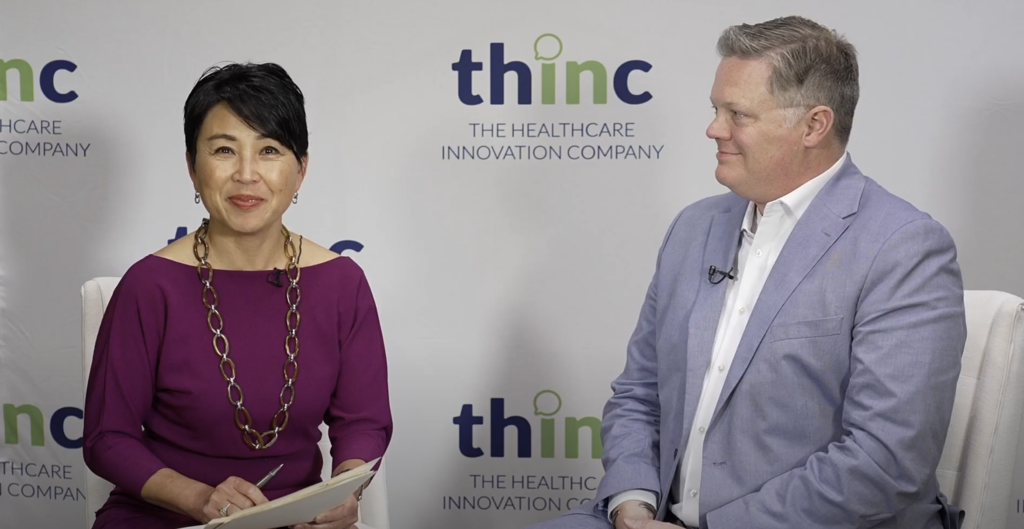Brian Wheeler, VP at CareFirst Blue Cross Blue Shield, discusses the evolution of healthcare and the importance of value-based care at the thINc360 conference. He highlights the role of social determinants in improving health equity and shares insights on how the pandemic has reshaped their approach to healthcare delivery. Join us as we explore innovative strategies for a healthier future.
You can view the full video interview here.
Key Takeaways from Brian Wheeler’s Interview
- Healthcare Transformation: The transition to value-based care is essential for improving the healthcare system. It requires collaboration and learning from each other’s successes.
- Impact of the Pandemic: The pandemic has been a catalyst for adopting virtual health and new ways of business operations. It has also strengthened partnerships within the healthcare community.
- Focus on Health Equity: Addressing social determinants of health is crucial for supporting underserved populations. Incorporating data on these determinants helps identify and support individuals in need.
- Innovation in Maternity Care: Efforts are being made to ensure better outcomes for expectant mothers and babies. Early intervention and comprehensive support are key to healthy pregnancies and deliveries
Insights on Healthcare Stakeholder Collaboration with Brian Wheeler
Mabel Jong:
I’m Mabel Jong and here with me is Brian Wheeler, who is VP at CareFirst Blue Cross Blue Shield. Brian, so great to see you.
Brian Wheeler:
Great to see you too, Mabel.
Mabel Jong:
This is a great meeting for many stakeholders to attend. You have a lot of ears listening to whatever message you want to bring. What are you saying to people on panels during this particular meeting?
Brian Wheeler:
You’re right, our stakeholders are broad. Employer groups are our customers, the healthcare delivery system represents our partners, and then of course there are other payers here as well.
I think that what we all need to keep in focus is the fact that healthcare is a four trillion dollar a year industry. It’s 18 percent of the U.S. economy, and we’re all interested in making improvements and changing it, but it’s not going to transform overnight.
You don’t just snap your fingers and transform 18 percent of the economy. So what we’re doing here is celebrating the successes each year, learning from each other what has worked in one market that can be adopted in another, and that kind of ability to cross-pollinate great ideas and to share is really the greatest value of this conference from my perspective.
Post-Pandemic Adaptations in Healthcare: Brian Wheeler’s Perspective
Mabel Jong:
A lot of people have put the pandemic behind them. I hope so. How has that changed what you’ve been doing at your place of work?
Brian Wheeler:
We had a volatile couple of years. I think our healthcare delivery partners would agree it was volatile for them too. Getting back to predictability and sustainability, you need that kind of foundation if you’re going to be able to assess a plan, implement, and then measure ongoing change.
It’s very difficult to track whether you’re making progress in a highly volatile environment. You need some stability and consistency so that you can measure incremental progress over time.
So we’re getting back to 2022 was back to some sense of steady state, and 2023 is feeling like hopefully steady state again too. We’re all able to get back to focusing on what good looks like and then coming up with programs to help us get to better with each passing year.
Pandemic as a Catalyst for Business Innovation and Collaboration
Mabel Jong:
Has the pandemic changed the way you do business in terms of assessing what is good and what is better?
Brian Wheeler:
It was a catalyst for a lot of things. I don’t know that it changed the way we do business. Virtual health certainly became normal and acceptable by consumers during the pandemic.
We had opportunities during the pandemic to talk with our partners about new ways of doing business coming out of the pandemic, new ways of contracting.
We implemented a lot of accountable care organizations in 2020 and 2021. We made good progress during that time, but it was progress that needed to happen pandemic or not.
The pandemic was a shock, hopefully a generational shock, that we all needed to get through together. It taught us some things. In a lot of ways, it caused our healthcare delivery partners to come together with us in a way that we hadn’t before.
We suddenly had to come together to organize around supporting our shared communities in a way that maybe we didn’t always see things the same way before.
So it catalyzed some relationships, some it catalyzed new contracts, and in that way, it has been important to advancing the concepts of value-based care and a shared definition of what success is.
Advancing Equity and Inclusion through Social Determinants and Data Sharing
Mabel Jong:
Certainly, the conversation has evolved around equity and inclusion. What sort of work do you see going forward?
Brian Wheeler:
There are a number of things that our partners are doing and that we’re doing to focus on better support of underserved populations, really bringing social determinants into the picture, understanding why people aren’t getting the results that we would like to see them get.
You know, the diabetic that lives in a food desert, the person that needs a colorectal screening but can’t get a ride and so it goes without and then has a late detection and a very bad outcome.
We’re more conscious of those things now. We’re incorporating social determinants data supports into our systems to help suggest that perhaps we have a member that needs additional supports.
That is now really going into not just what we see as the payer but we’re sharing that data with our provider partners. We have examples of primary care practices that had no idea they had in their population folks that were facing food insecurity.
With the revelation that they have people in their population that were facing food insecurity, we were able to bring that data to them and then they’re partnering with food banks to make sure that they’re addressing the need of their population.
They never would have thought that their population in some areas would have trouble with food security, but there are folks in the population that do.
Bringing the awareness, turning that into action, and then causing a better result to happen has been a result of this evolution and the increased awareness on social determinants and driving better equity in healthcare.
Mabel Jong:
That’s significant. Are there any other examples like that you can share?
Brian Wheeler:
We’re doing a lot of work in the maternity journey and making sure that we’re getting better results for expectant mothers and the babies. A lot of resources and work are going into that.
Social determinants are helping us identify folks who may struggle to have a healthy pregnancy, and then we have interventions that can help them have a better outcome.
It’s getting to those folks earlier and making sure that they’re taking good care of themselves throughout their pregnancy, that they have the support and education, health literacy, all the things necessary to have a healthy delivery and healthy mom, healthy baby.
Insights and Learning from thINc360: A Hub for Industry Innovations and Connections
Mabel Jong:
Terrific. This is a terrific meeting. People seem very happy to be back. Who do you think you’re reaching by coming to thINc360?
Brian Wheeler:
I want to hear more than I want to reach necessarily. I want to know what other people are doing, how they’re thinking, how they’re framing things, what’s going on in different markets around the country.
I think it’s in all of our nature to be heads down focused on our business every day, and if we do that too much and we don’t take some time to step back and understand what other people are doing, we get our head very much buried in the sand.
So the opportunity to take a step back from the office for a period of the conference and to come and hear from other people, learn about the different partners that are out there, the different service providers that support payers or providers, and understand what technologies and things are growing in the industry, it’s a really wonderful opportunity to do all that in a short period of time. Make sure that my head is not in the sand and that I am keeping a lookout for what’s next and what others are doing and what might apply to our market as well.
Mabel Jong:
All right. Thank you so much, Brian.
Brian Wheeler:
Of course. Thanks for your time.
Mabel Jong:
Thanks for watching.


